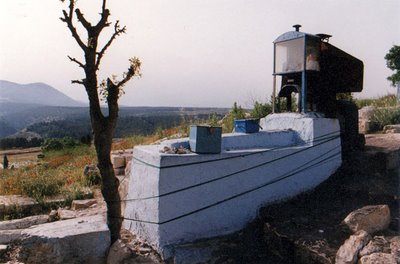
Rabbi Yosef Karo Hilulah Nisan-13
Rabbi Yosef Karo
Born: Toledo, Spain, 1488
Died: Tzefat, Eretz Yisrael, 1575
Popularly known as Beit Yosef and Shulchan Aruch, for his major works. Also known as the Mechaber, the author. Talmudist, codifier of Halachah.
In 1492, in the wake of the great expulsion of Spanish Jewry, when Yosef Karo was 4 years old, his family was forced to flee Spain. After protracted wanderings they settled in Constantinople, Turkey. He gained repute as an eminent Torah scholar at an early age, and at age 24, while living in Adrianople, he began writing his famous work, Beit Yosef. It is a commentary on Arba Turim by Rabbi Yaakov, son of Rosh, and it took him 20 years to complete. Under the influence of the great kabbalist Rabbi Shlomo Molcho, he followed an ascetic life-style of fasting and pious devotion to God.
In 1530 Rabbi Karo moved to Tzefat (Safed), in Eretz Yisrael, where he was appointed as a member of the Rabbinic Court of Rabbi Yaakov Beirav. He established a yeshivah, counting among his students the great Rabbi Moshe Alshich and the illustrious kabbalist Rabbi Moshe Cordovero (Remak) .
Upon the death of rabbi Yaakov Beirav, he succeeded his as Chief of the Rabbinic Court in Safed, which served as the main bet din (court) for worldwide Jewry. through his monumental books he became the acknowledged preeminent Torah authority in the world, a reputation that has not waned with the passage of time. In his work Beit Yosef, he compiles all the variant views on each halachah and renders a decision as to which opinion is to be the authoritative law. It is printed alongside the text of Arba Turim. Rabbi Yosef Karo follows a cardinal rule in arriving at his decisions. If on a given issue Rif, Rambam, and Rosh are in agreement, then that matter becomes Halachah (Law). If they disagree, the halachah is decided according to majority opinion. His rulings reflect his Sephardi background in that they favor Sephardi customs over Ashkenazi practices. After the completion of Beit Yosef, Rabbi Yosef Karo wrote the Shulchan Aruch. As its title implies, Shulchan Aruch -"The Set Table" - presents all Jewish laws and customs relevant to the present time in clear and concise Hebrew, arranged systematically according to topics. This work, consisting of four sections, is the cornerstone of authoritative Halachah to this very day. It is the Code of Jewish Law par excellence. Initially, the Shulchan Aruch met with resistance on the part of German and Polish rabbinical authorities because its rulings favored Sephardi practice, disregarding Ashkenazi traditions. Foremost among his critics was Rabbi Moshe Isserles (Rema) of Cracow, Poland, whose critical comments have been incorporated as glosses into the running text.
Among Rabbi Yosef Karo's other works is Kesef Mishneh, a commentary on Rambam. By clearly mentioning the sources on which his decisions are founded, Rabbi Yosef Karo has given Halachah a solid foundation. His work has stood the test of time.
Rabbi Yosef Karo was a pure and holy man to such a degree that when he studied Kabbalah he was taught by a special angel called a maggid who descended from heaven to reveal to him the innermost secrets of the Torah and to disclose the future to him. Rabbi Yosef Karo wrote down the revelations which he heard from this angel in a book called Maggid Meisharim. This book contains not only Torah concepts but also exhortation, musar. We learn from this book that the angel told him that his writings would have widespread acceptance throughout the Diaspora and would become a fundamental text for determining the halachah for Jewry throughout the ages. He would become Rabban shel Yisrael, the master and teacher of all Jewry.
May the merit of the tzaddik Rabbi Yosef Karo protect us all, Amen.

No comments:
Post a Comment